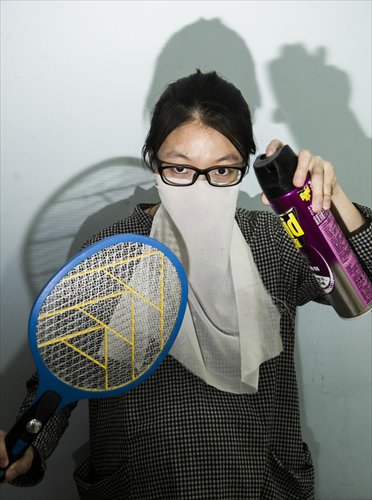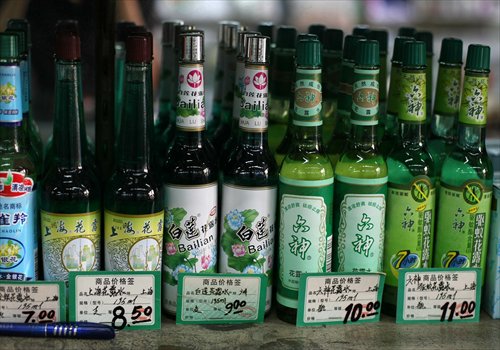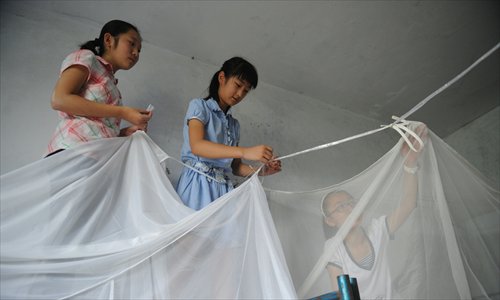Myth-quito busters

Mosquitoes are a seasonal scourge for Beijingers, but by learning more about the pint-sized pests you can ensure they don't suck the fun out of summer. Photo: Li Hao/GT
Beijing is being invaded by parasite immigrants winging it from one vulnerable victim to the next. They use your home as a breeding ground and inflict love bites that can transmit diseases. No, we're not talking about foreigners with expired visas. They are summer's dreaded guests: mosquitoes.
The capital has been hit by an alarming surge in the proportion of disease-carrying mosquitoes since May, according to the Beijing Center for Disease Control and Prevention.
Among the most dangerous buzzing about are the Aden fever-carrying Asian tiger (Aedes albopictus) and Japanese encephalitis-carrying Culex tritaeniorhynchus species. Once a pest that preferred preying on livestock, the latter species has grown increasingly fonder of human blood as proven by reports showing its numbers in urban areas were five times higher in 2013 compared to five years ago.
To ensure you enjoy your summer without letting mosquitoes get under your skin, Metropolitan separates truth from hearsay by probing 10 frequently asked questions among Beijing locals and expats about mosquitoes.
In addition to sourcing academic reports and government guidelines from home and abroad, we also spoke to pest control expert Bu Xiangjian from the Beijing Xiandai Pest Control Center.
Q: Is it too soon for me to worry about mosquitoes in Beijing?
A: No.
"The peak time [for mosquito activity] is arriving now," warned Bu.
The environment for mosquitoes in Beijing has changed amid increased urbanization, a study of the insects published in April by the Chinese Journal of Vector Biology and Control found.
A seasonal fluctuation diagram showed that adult mosquito density peaks in July and August, with larva density peaking in June and July.
In light of these findings, experts suggest May is the ideal time for Beijing residents to carry out spring cleaning to ensure their homes don't support mosquitos' breeding cycle.
Now is the best time to destroy larvae, which is more important than fussing about killing adult mosquitoes, said Bu. "You should regularly clean out air conditioner vents, garden pots, cans, vases, buckets, fish tanks and pipes to prevent mosquitoes from breeding in water," he said.
Q: Are some people more attractive to mosquitoes than others?
A: Yes.
Mosquitoes have a preference for some people over others, but the pests don't pick their victims based on blood type, gender, age or even menstruation cycle like some rumors suggest.
Mosquitoes instead choose their prey based on smell, specifically the carbon dioxide and lactic acid released by animals and people, said Bu. In response to the claim that overweight people attract more mosquitoes, Bu said it could be credible if they "breathe faster, produce more carbon dioxide and have stronger body odor."
"There are no major differences between men and women, but showering regularly is recommended for both genders," he added.
Q: Are some people more vulnerable because of their skin color or other physical traits?
A: Yes.
Mosquitoes swarm to dark clothes because their vision is more attracted to "gloomy environments at certain distance," said Bu. Dark clothes absorb heat, which further attracts mosquitoes. However, genetics as well as fair skin may also play a role in luring mosquitoes, according to Joe Conlon, technical adviser at the American Mosquito Control Association.
Because perspiration can attract the attention of mosquitoes, East Asians, who have fewer apocrine sweat glands than Europeans, are theoretically less at risk of being devoured by mosquitoes.
The bad news? If you are a sweaty Caucasian who likes wearing black, you might want to change your look for summer.
Q: Can my scent attract mosquitoes?
A: Yes.
"Be wary about the perfume and makeup you wear. Some attract or repel mosquitoes, depending on their ingredients," said Bu. Generally, mosquitoes prefer sweet, floral scents common in lotions, perfumes and soaps.
Besides carbon dioxide and lactic acid, other attractants for mosquitoes include fruity fragrances, skin temperature and moisture, according to a blog by Anne Marie Helmenstine, who has a doctorate of philosophy in biomedical sciences from the University of Tennessee.
People who eat high-potassium foods produce more lactic acid, which makes them appealing to mosquitoes. High-potassium foods include potatoes, prunes, raisins, spinach, bananas, lima beans and salami.
Q: Is it true smelly feet attract mosquitoes and garlic repels them?
A: Yes.
In 2011, CNN reported that researchers in Tanzania had chemically reproduced the stench of smelly feet to lure and kill mosquitoes to combat the spread of malaria.
So, there's one more reason to farewell your friend who has foot odor.
Eating garlic or staying in a garlic-scented environment has been known to repel mosquitoes. If you are more afraid of mosquito bites than social suicide, eat lots of raw garlic or even wear a necklace of cloves.
If you don't want the Beijing taxi driver smell, don't despair - there are more fragrant, natural alternatives, including citronella, cinnamon, cedar, peppermint and clove oils, according to Helmenstine.

Chinese supermarkets provide a rich array of insect repellents, all of which have safe levels of the active chemical DEET. Photo: CFP
Q: Are natural remedies as effective as chemical repellents?
A: No.
"People should keep peppermint plants in their homes as they are great at repelling mosquitoes," said Bu. Other plants that drive the bugs away include pyrethrum, evening primrose, citronella and wormwood.
Many people feel more comfortable using natural repellents, especially parents with young children and pregnant women.
Traditional Chinese methods also include applying sesame oil or other cooking oils, but this method only works for a few moments and "isn't very sanitary," said Bu.
The US Centers for Disease Control and Prevention (CDC) only recommends one natural ingredient to be used in repellents: lemon eucalyptus oil.
Q: Can I trust Chinese insect repellents?
A: Yes.
Most products on the Chinese market contain ethanol, citrus oils and active ingredients to repel mosquitoes, according to a report published in March 2013 by experts from the National Institute for Communicable Disease Control and Prevention under the Chinese Center for Disease Control and Prevention.
Among the four active ingredients recommended by the CDC, only the chemicals DEET and picaridin are used in repellents on the Chinese market. Most commercial mosquito repellents contain 4 percent to 15 percent of DEET, much lower than the recommended highest level of 30 percent in North America.
According to Chinese national standards, repellents must effectively repel mosquitoes for at least four hours.

Erecting a mosquito net over your bed is a sure way to avoid being feasted upon by mosquitoes at night. Photo: CFP
Q: Can repellent ingredients be harmful?
A: Yes.
DEET contains traces of carbon dioxin and other elements that attracts mosquitoes. It was first used in 1946 by the US military, and was registered for general public use in 1965. CDC data shows that about one-third of Americans use repellent products containing DEET.
Few people have been sickened by exposure to DEET despite its widespread use. However, it can be toxic if used improperly, including on wounds and eyes, ingested or applied excessively to children.
Instances of children suffering headaches, irritability, loss of consciousness and seizures due to DEET exposure are rare but possible. The CDC suggests applying repellent no more than once per day for babies between six months and 2 years old, and less than three times per day on children aged between 2 and 12. Repellents should also be kept away from naked flames because of their high ethanol content.
Q: Are high-tech repellent devices effective?
A: No.
Bu noted there are some smartphone apps that purportedly emit ultrasound waves to drive away mosquitoes, but most are bogus. "Don't fall for them, or those 'special drugs to kill rats or bugs' either," he said.
Although his job requires using powerful chemicals and equipment, Bu doesn't recommend people use them in their homes. "It isn't necessary to have bug-killing lamps," said Bu. "The ultraviolet light hurts people's eyes and the electric shocks result in airborne particles when the bugs are zapped. Tiny powders that carry germs can be inhaled or contaminate food."
Q: Are there any less-known tricks to drive away mosquitoes?
A: Yes.
According to tips provided on the website of the Beijing Center for Disease Control and Prevention, a simple way to keep mosquitoes at bay is spraying your bed curtains and clothes with repellents. One can also build their own mosquito traps by putting a bottle of sugar water or beer in dark corners of a room. Mosquitoes will be attracted by the sweet smell and become stuck in the sugar water or beer.
If these methods don't work, you can always resort to the good old-fashioned method of swatting with your hands - even if you look like an applauding one-person audience.
Newspaper headline: Swat away the biggest misconceptions about mosquitoes this summer